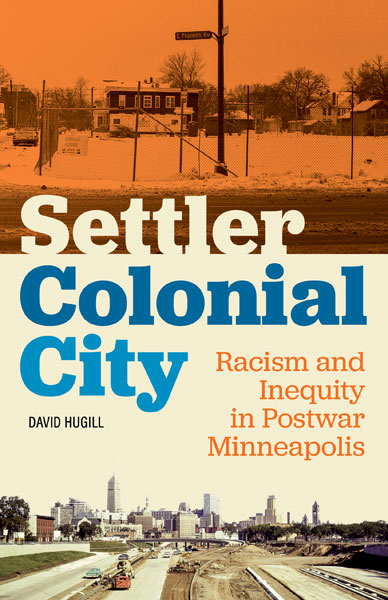
by BEN HEATH
As part of the 2022 Minnesota Book Awards, scholar David Hugill is the recipient of the Minnesota History award for his book Settler Colonial City. Hugill’s book, published last year by the University of Minnesota Press is a critical look at some of the social forces in Phillips after WWII. Our present city and our neighborhoods are not neutral places where history is suspended, instead they are founded in settler-colonial relations, where white supremacy and non-white oppression are by design. The author lived and worked in Phillips as he completed his research.
Hugill describes the neighborhood of Phillips in terms of “sites of articulation”, meaning places where the interactions between two or more social factors are especially visible. Minneapolis is the Settler Colonial City, and Phillips is where the record is rich in material. This a study of racism and inequity. It should come as no surprise that our community has seen much. Over the years and decades since white settlement, our city and state institutions have thrived because of the prevailing settler-minded attitudes of exploitation and domination codified by government policies of Indian termination, removal, and relocation. These policies continue to effect many residents of our neighborhood. In response, our community is also the site of resistance.
From the beginning of the book, Phillips is established as a community of people largely excluded from the decision-making and rewards of so-called urban renewal or urban change. Largely because of this exclusion the community has been of interest to well-meaning liberal anti-racist organizations who unfortunately used racist settler-minded thinking to develop and administer their programs. The author implicates these organizations in the perpetuation of inequity, rather than as significant challengers against it.
There are other examples of these relations. Most visible of the settler-colonial relations found in the racialised policing and police brutality in our neighborhoods. In response, the community developed AIM and neighborhood counter-patrols as police violence and intimidation reached new lows. Corporations like Honeywell have used our neighborhood to promote their own moral and ethical virtues even as they take advantage of our people to make their weapons of war (even as our neighborhood becomes the new home to refugees escaping from the use of those very same weapons).
Material from the alley newspaper’s 46+ year history makes an appearance in the book. Cartoons from 1986 and 1991 by Eric Almond offer commentary on both police brutality and the weapons of war made in our neighborhood. Also included in the research is writing by Wizard Marks, Steve Compton, Steve Parker, Chuck Robertson, and Bob Woligora. One of the photos on the cover of the book is by long-time alley contributor Paula Williamson.
As you might have guessed this book wasn’t easy reading, both because of the academic audience and because of the sadness and anger that I felt as dots are connected, as evidence piles up. At the same time there is much for all of us to learn from these stories. It is a credit to our community for our history to be told even some of it is hard to think about. But it’s vital to stop denying the foundations of our country and our states. We need to be able to see the connection between the unrepaired violence of the past with the systems of oppression around us today.









